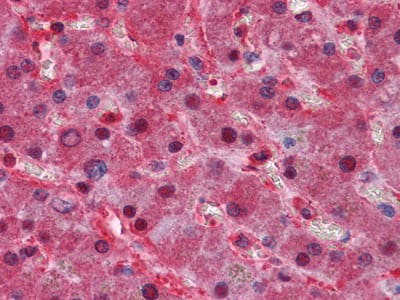
| WB | 咨询技术 | Human,Mouse,Rat |
| IF | 咨询技术 | Human,Mouse,Rat |
| IHC | 1/200 - 1/1000 | Human,Mouse,Rat |
| ICC | 技术咨询 | Human,Mouse,Rat |
| FCM | 咨询技术 | Human,Mouse,Rat |
| Elisa | 1/10000 | Human,Mouse,Rat |
| Aliases | LP; AK38; APOA; LPA |
| Entrez GeneID | 4018 |
| clone | 8F6A9 |
| Host/Isotype | Mouse IgG1 |
| Antibody Type | Primary antibody |
| Storage | Store at 4°C short term. Aliquot and store at -20°C long term. Avoid freeze/thaw cycles. |
| Species Reactivity | Human |
| Immunogen | Purified recombinant fragment of LPA (1823-2013) expressed in E. Coli. |
| Formulation | Purified antibody in PBS with 0.05% sodium azide. |
+ +
以下是关于LPA抗体的3篇代表性文献摘要(注:文献标题和作者为示例性概括,具体文献需根据实际检索确认):
---
1. **"Therapeutic targeting of lipoprotein(a) with a human monoclonal antibody"**
- **作者**: Tsimikas, S. 等
- **摘要**: 研究开发了一种靶向脂蛋白(a) [Lp(a)] 的人源化单克隆抗体,通过特异性结合Lp(a)的氧化磷脂成分,显著降低其血浆水平,并在动物模型中减少动脉粥样硬化斑块形成,为心血管疾病治疗提供新策略。
2. **"Anti-LPA1 antibody attenuates bleomycin-induced pulmonary fibrosis in mice"**
- **作者**: Swaney, J.S. 等
- **摘要**: 提出一种靶向溶血磷脂酸受体1(LPA1)的单克隆抗体,在小鼠肺纤维化模型中有效阻断LPA-LPA1信号通路,抑制成纤维细胞活化和胶原沉积,表明其在纤维化疾病中的治疗潜力。
3. **"Monoclonal antibody against lysophosphatidic acid inhibits ovarian cancer progression"**
- **作者**: Xu, Y. 等
- **摘要**: 通过体外和体内实验证明,抗溶血磷脂酸(LPA)的单克隆抗体可阻断LPA介导的细胞迁移和侵袭,显著抑制卵巢癌转移,提示LPA抗体在肿瘤治疗中的应用价值。
---
**注**: 以上内容为领域内典型研究方向示例,实际文献需通过PubMed或学术数据库检索确认。若需具体文献,建议使用关键词“LPA antibody”“lipoprotein(a) immunotherapy”或“lysophosphatidic acid monoclonal antibody”进一步查询。
**Background of LPA Antibodies**
Lipoprotein(a) [Lp(a)] antibodies are immunological tools or therapeutic agents targeting Lp(a), a unique lipoprotein particle associated with cardiovascular diseases (CVD). Lp(a) consists of an LDL-like core bound to apolipoprotein(a) [apo(a)], a glycoprotein homologous to plasminogen. Elevated Lp(a) levels, genetically determined, are an independent risk factor for atherosclerosis, thrombosis, and aortic valve stenosis due to its pro-inflammatory, pro-atherogenic, and potentially thrombogenic properties.
Lp(a)-specific antibodies are developed to either neutralize its pathogenic effects or quantify Lp(a) in diagnostic assays. In research, monoclonal antibodies against apo(a) or Lp(a)'s oxidized phospholipid content help elucidate its role in CVD pathogenesis. Therapeutically, antibody-based strategies, such as antisense oligonucleotides or siRNA (e.g., pelacarsen, olpasiran), aim to reduce Lp(a) synthesis, though these are not traditional antibodies but leverage similar targeting principles.
Clinical interest in Lp(a) antibodies surged due to the unmet need for therapies addressing elevated Lp(a), which affects ~20% of the population. While statins lack efficacy on Lp(a), emerging antibody-inspired biologics and vaccines show promise in early trials. Challenges remain in ensuring specificity, minimizing off-target effects, and demonstrating long-term CVD risk reduction. Additionally, standardized Lp(a) immunoassays are critical for accurate risk stratification, as apo(a)'s size heterogeneity complicates measurements. Overall, Lp(a) antibodies represent a frontier in precision medicine for inherited lipid disorders.
×